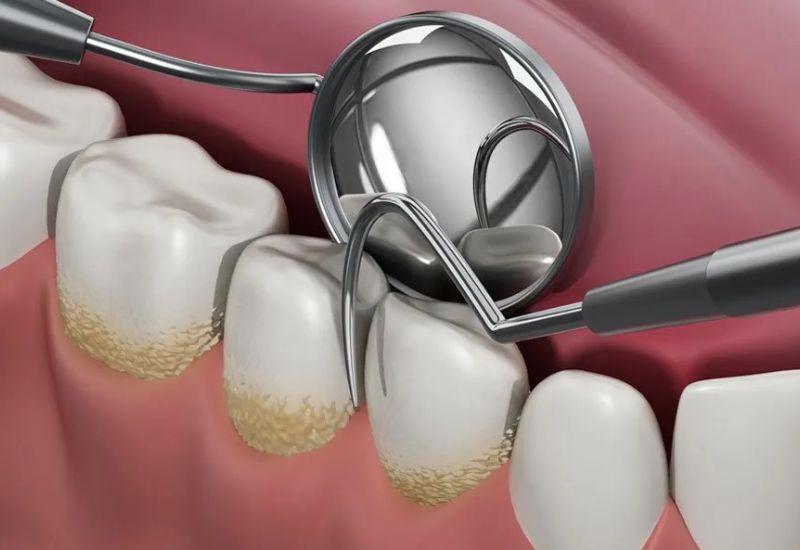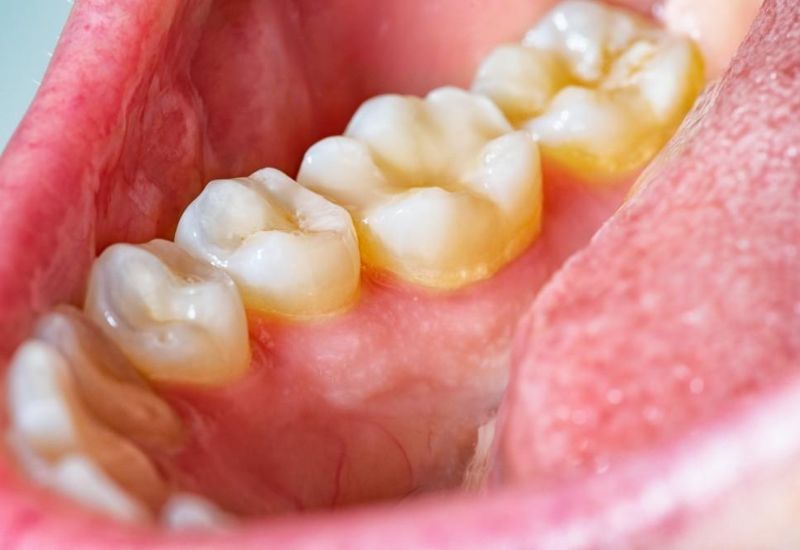Tartar buildup on teeth can lead to serious oral health issues if left untreated. This common problem, which forms from hardened plaque on the tooth surface, is more than just a cosmetic concern. In this article, we’ll look at how tartar buildup occurs, why it’s harmful, and how to prevent it effectively.
1. What is Dental Tartar?
Dental tartar refers to hardened plaque that accumulates on the tooth surface, around the gumline, and even beneath the gumline in severe cases. It appears as a yellowish or brownish deposit that is more noticeable over time, especially in individuals who smoke or consume dark-colored beverages. There are two main types of tartar: regular tartar, which appears white or yellowish, and serum tartar, which has a reddish-brown color due to blood mixing with plaque in cases of gum inflammation or periodontal disease.

Tartar appears as off-white, yellow, or dark brown deposits on the teeth or below the gumline.
2. How Does Tartar Form?
Tartar forms when plaque, food debris, and bacteria are not adequately removed from the teeth and between the gumline. Approximately 15 minutes after eating, a thin biofilm begins to develop on the surface of the teeth. This film is a breeding ground for bacteria, which multiply and accumulate, eventually forming plaque.
Poor oral hygiene practices are often the leading cause of tartar buildup. Contributing factors include:
– Infrequent brushing, especially after meals and before bedtime.
– Failure to use dental floss or a water flosser to clean between teeth.
– Neglecting to clean the tongue and entire mouth.
– Consuming a diet high in sugar, acidic foods, and fatty substances.
– Smoking, drinking alcohol, and consuming soda or other sugary drinks.
In the early stages, plaque can be removed through regular brushing and flossing. However, if it remains on the teeth, minerals from saliva will cause it to harden into tartar. At this stage, only a dental professional can remove it effectively.

Tartar forms when plaque and food particles on the teeth or between them calcify.
3. How Tartar Affects Oral Health
– Makes Oral Hygiene Difficult: Tartar buildup between teeth and along the gumline creates areas where bacteria and food particles can accumulate, making it challenging to clean effectively. This leads to even more plaque formation and more tartar over time.
– Causes Bad Breath: Bacteria thrive in tartar deposits, producing byproducts that cause persistent bad breath, which cannot be remedied simply by using mouthwash.
– Leads to Dental Diseases: Tartar provides a conducive environment for bacteria that can lead to serious dental problems, including cavities, gingivitis, and periodontitis. If not addressed, tartar can damage the tissues surrounding the teeth, making gums loose and increasing the risk of tooth loss.
– Impacts General Health: Harmful bacteria from tartar can enter the respiratory and digestive systems, potentially leading to throat infections, tonsillitis, and digestive issues.
4. Preventing Tartar Buildup
Preventing tartar formation starts with a solid oral hygiene routine. Here are some key practices to help:
– Brush Twice a Day: Brush your teeth two to three times a day—after waking up, after meals, and before bed. Use a toothpaste with fluoride for added protection.
– Use the Right Toothbrush: A soft-bristled toothbrush can reach between teeth and along the gumline effectively without irritating your gums.
– Floss Daily: Use dental floss or a water flosser to remove plaque and food particles from between your teeth.
– Clean Your Tongue: A significant number of bacteria reside on the tongue. Use a tongue scraper or your toothbrush to clean the tongue’s surface thoroughly.
– Rinse with Mouthwash: Regularly rinsing with saline or an antibacterial mouthwash can help eliminate bacteria and keep the entire mouth clean.
– Get Regular Cleanings and Checkups: Schedule a professional dental cleaning and checkup every three to six months. A dentist can remove tartar deposits and monitor your oral health.

Regular tartar removal is recommended to prevent serious dental issues.
In addition to these habits, a balanced diet supports oral health:
– Maintain a Healthy Diet: Focus on a balanced diet with a variety of nutrients. Consuming fresh vegetables and fruits will provide essential vitamins that promote oral health.
– Stay Hydrated: Drinking water, especially after meals, helps rinse away food particles. Additionally, yogurt can help balance oral bacteria.
– Limit Sugary, Acidic Foods and Beverages: Reduce intake of sugary snacks, acidic foods, and sugary or carbonated drinks, as they contribute to plaque formation.
– Avoid Smoking and Alcohol: Smoking and excessive alcohol consumption can stain teeth and increase the risk of tartar buildup. Carbonated beverages also pose a risk for tooth enamel erosion.
Understanding how tartar forms and taking preventative measures is essential for maintaining a healthy smile. Tartar buildup, if untreated, can significantly impact oral health and lead to severe issues like tooth decay, gum disease, and even systemic infections. With regular dental cleanings and good oral care habits, you can protect your teeth and enjoy long-term oral health.








